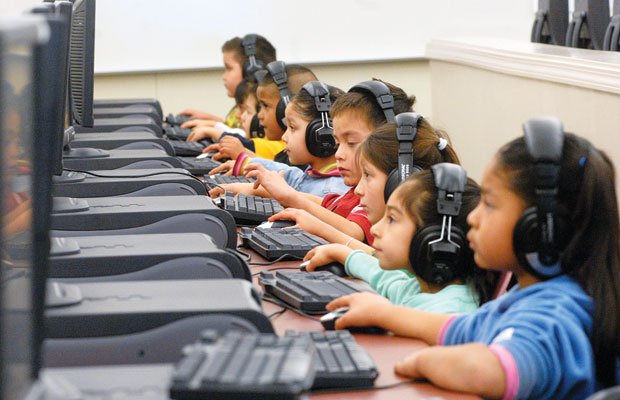Eliot elementary uses technology, smaller student-to-teacher
ratios
to boost academic achievement
Eliot Elementary School classrooms are dotted with empty seats. And fewer children frolic in the fresh air during their midday lunch and recess break. But teachers aren’t marking any more absentees off their list than usual.
With the help of staff, Principal James Dent has implemented a variety of new initiatives at Eliot to bolster scores on the upcoming statewide tests. A big change is smaller classroom ratios. Low scoring students are plucked from their classrooms and meet in ratios as low as 10 students to one teacher, receiving instruction targeted to bringing them up to speed. On the other end of the spectrum, skilled mathematicians are challenged with advanced material to keep them at the top of their game.
“We spend a lot of time looking at how students are performing,” Dent said. As a result, classes are broken down by performance bands, each band receiving the instruction they need to help them excel.
“It was tough to have such wide ranges,” Dent said. “Performance at higher grades was dropping off.” When students make the leap from third to fourth grade, their class sizes skyrocket from 20 to about 32 students, he said. Scores on the state test seem to plummet when class size goes up. While 49 percent of second graders were performing at the proficient or advanced level, only 15 percent of fifth graders were measuring up last year. “The advanced kids get bored, distracted and the low students get lost.”
Student performance is highly visible at Eliot. Data, charts and graphs mapping the progress of each student, class and grade level wallpaper the school’s halls and classrooms and act as a “huge motivator,” Dent said. A large, colorful chart tacked up outside Dent’s office shows six lines, gradually sloping upward. The lines represent each grade’s progress.
This spring, Eliot needs to add between five to 10 points to its Academic Performance Index score of 668 to reach its target. The state target score is 800, with annual growth of at least five points. Additionally, 36 percent of all Gilroy’s students across all subgroups are expected to perform at the proficient or advanced level to make the federal growth model. Eliot did not make the mark last year.
A variety of computer programs has infiltrated Eliot’s curriculum to gear students up for May testing. Every day, each student spends at least 20 minutes bathed in the glow of a computer screen. During that time, they churn out a multitude of data teachers use to plan their lessons accordingly. With the help of a computer program called SuccessMaker, teachers can see which students are up to speed, and which ones are lagging.
A mid-year printout of a first grade class showed about 75 percent of the class was already performing closer to a second grade level or higher in math. Similarly, 95 percent of a third grade class was performing at nearly a fourth grade level.
“The program is excellent at going back and filling in any information they missed,” Dent said. “It’s hard to do systematically as a teacher because of so many students. The program covers both ends, the lows and the highs.”
Fourth and fifth grade teachers, especially, combat their large class numbers with the help of the program. Over the course of two weeks, students are presented with 300 questions, either math or language arts. The computer gauges their ability and they proceed with lessons that are appropriate for their skill set.
In a traditional classroom, struggling students can often fall through the cracks when their lessons accelerate at a pace faster than their learning. The state instructs schools to teach at grade level, Dent said. Supplemental programs like SuccessMaker go back and provide the support system that some students missed the first time around.
“That’s what’s so great about the program,” Dent said. “Most go at a linear pace.” Eliot is the only school using SuccessMaker.
“His approach is unique and he’s eager to try things that have been proven to show that they support student achievement,” said Assistant Superintendent of Student Services Basha Millhollen. “He is data based. We are constantly re-examining the progress kids are making and he’s had our support all along the way.”
Dent waved to Trustee Jaime Rosso when he poked his head into Dent’s office to say hello. Together, they consulted the wall chart outside his office as pint-sized kindergartners scurried past on their way to lunch.
“He’s our innovator,” Rosso said with a smile. Encouraged by the data, the two were confident that the new initiatives would positively affect test scores.
In addition to SuccessMaker, a program called Accelerated Reader has “changed the culture of reading at Eliot,” Dent said. The Web-based program quizzes students on their comprehension level and gives them a score that allows them to choose books that match their reading level.
“It totally changes the amount of reading kids do and how excited they are to read,” Dent said. He used to see first and second graders lugging around Harry Potter titles. Instead of being impressed by their ambitious choice – the books are at a fifth or sixth grade reading level – he was skeptical of their ability to comprehend the story.
“The program tells whether or not the book is way too hard for the kid to read,” he said. “It gives teachers the opportunity to believe that their students understand the book they just read.”
“We’ve bombarded them with reading,” he said. “And it looks like it’s working. We’re having a great year so far.”














